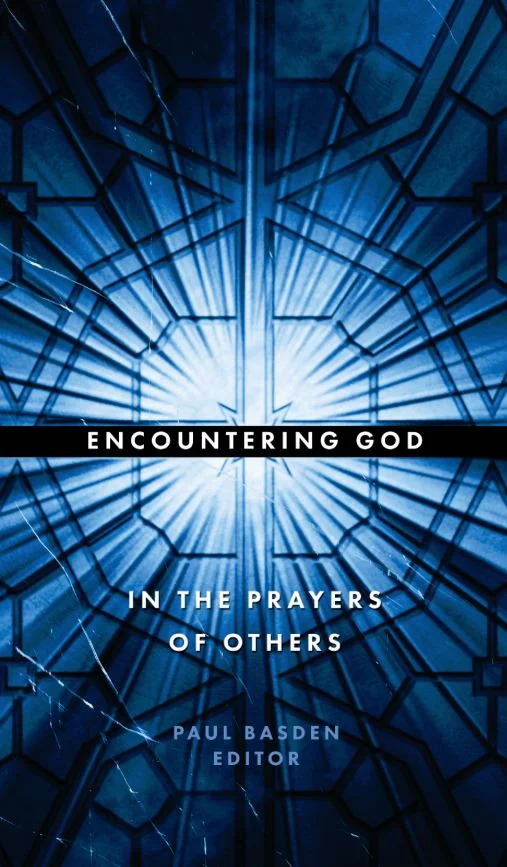Encountering God in the Prayers of Others | Paul Basden
Encountering God in the Prayers of Others | Paul Basden
Introduction:
Lord, Teach us to Pray
When Jesus’ followers saw him praying, they knew that he connected to God in a profound way. Wanting to know how they could do the same, they asked: “Lord, teach us to pray” (Luke 11:1). Their request continues to be the desire of all who long for a meaningful life with God.
Learning how to pray can happen in many ways. Sometimes we learn to pray from those who pray for us and with us. My parents prayed over our meals by day and over us by night. A spirit of gratitude and intercession pervaded my early life. My initial prayers were no doubt formed by what I heard them say to God in my presence.
As we mature, we involuntarily learn to pray when crises hit. Mimicking our parents’ prayers doesn’t help in those moments. Difficulties drive us to articulate that most personal of prayers, “God, I need you right now . . . .” Perhaps for the first time in our lives, we talk to God from our hearts, in all sincerity. Adversity became our instructor.
Praying Scripture is another way to mature in our life with God. When we read the Bible, we listen for God’s voice. When we discern his direction, we respond in prayer. Often our words simply repeat the language of Scripture. If you are reading a psalm of thanksgiving like Psalm 103, and you want to pause and tell God how grateful you are for all of the blessings in your life, then it would be natural for you to repeat the words of gratitude from verses 1-2: “Bless the Lord, O my soul, and all that is within me, bless His holy name. Bless the Lord, O my soul, and forget none of His benefits” (Ps 103:1-2 NASB). Praying Scripture gives us the benefit of beautiful, borrowed language to talk to God. In this way, God’s Spirit teaches us to pray.
But there is a final way we learn to pray—one that is fluent and familiar to those in the liturgical traditions, but like an unknown tongue to many in the Free Churches. I refer to the practice of meeting God in the prayers of others. Since this approach can be both misinterpreted and misapplied, it would be wise to name and address three misunderstandings.
The first complaint is that praying the prayers of others is impersonal. This much is true: you are praying someone else’s prayers, not your own. How could it possibly be personal to simply say what someone else has said? To that question, we must answer that while speaking what others have said does not magically make it our own, yet repeating the words of others can be highly personal. Think of repeating the Pledge of Allegiance or the Lord’s Prayer. Think of singing the National Anthem or your favorite hymn. You didn’t write them, but with a little personalized attention, they can become quite meaningful. The same is true with praying others’ prayers: by personalizing them, they become peculiarly yours.
A second roadblock can be circumstances. Praying someone else’s prayers can feel awkward if the situation you’re facing differs from the focus of the fixed prayer you’re repeating. But remember: this is no different from reading and praying the Psalms. If you read a Psalm each day as an aid to prayer, it is unlikely that the directional arrow of your life will always intersect the directional arrow of the Psalm. What should you do? First, sincerely pray the Psalm you have read that day, trusting God to open your eyes to a situation you may soon face; and second, find another Psalm that speaks to your specific setting. You can pray the prayers of others in the same way. If you are reading a prayer that doesn’t fit your life one day, pray it anyway. Trust God to reveal to you something you may have missed before. At the same time, you may want to find another prayer that addresses your immediate condition.
A third mistake is to think that mere repetition of someone else’s prayers can benefit your life with God. Nothing could be further from the truth. Jesus was clear about the uselessness of rote requests: “And when you are praying, do not use meaningless repetition as the Gentiles do, for they suppose that they will be heard for their many words” (Matthew 6:7, NASB). Utilizing the prayers of another can benefit your life in God’s Kingdom only if you think about the words you are saying and, as much as possible, try to imagine and identify with the emotions experienced by the original author.
With these caveats in mind, the prayers of others can be a wonderful way to encounter God. This book offers reflective essays on prayers that have become meaningful to the authors over the years. Our aim is to commend this practice to all who want to continue to learn to pray.
Finally, let me relate the genesis of this volume. In 1990, Fisher Humphreys initiated a semi-annual retreat for theologians whom he knew. As a longtime seminary professor, Fisher knew many people who loved to read and discuss Christian theology. Those whom he invited to attend these retreats became part of an unofficial society called “The Trinity Group.” A few years ago, seven members of this group concluded that one way to be a good steward of God’s activity in our lives would be to share some of the written prayers that have helped us on the pathway to discipleship. Our prayer for this book comes from Psalm 115:1: “Not to us, O Lord, not to us, but to your name goes all the glory for your unfailing love and faithfulness” (NLT). Amen.
Paul Basden, editor
